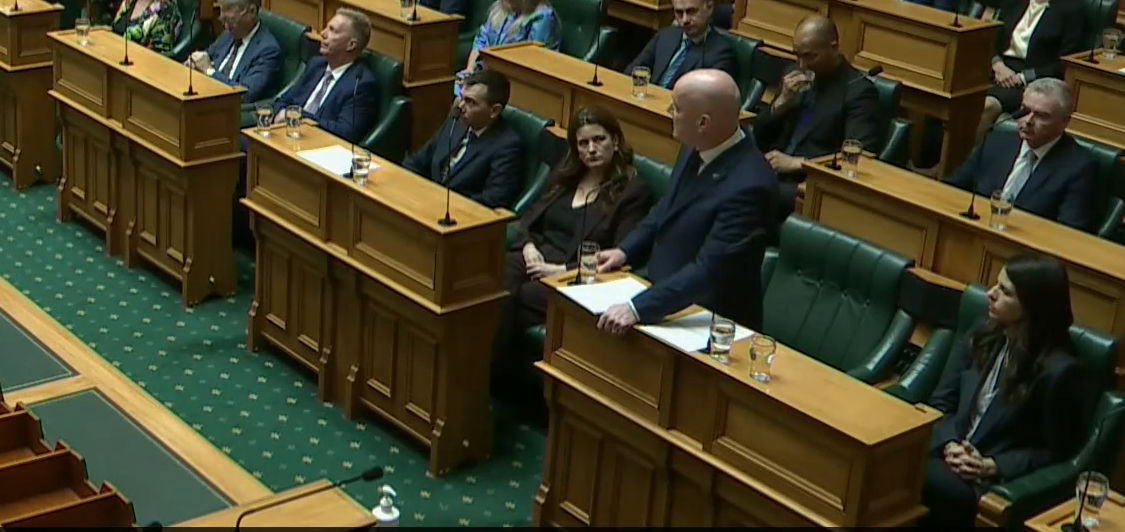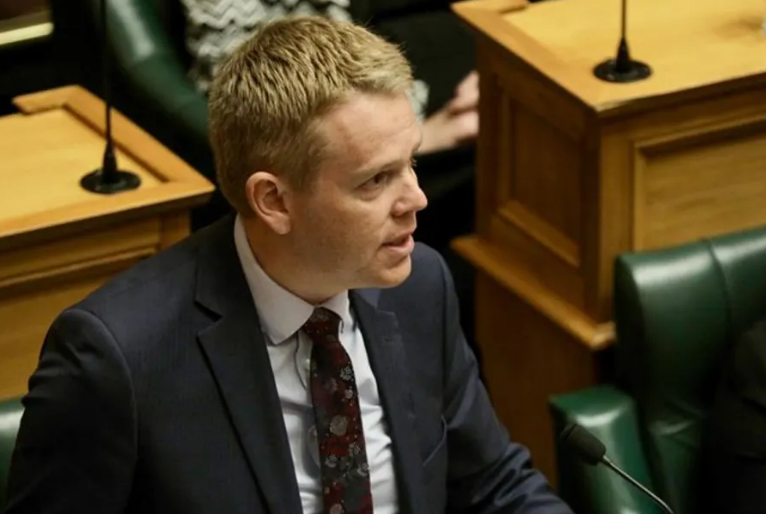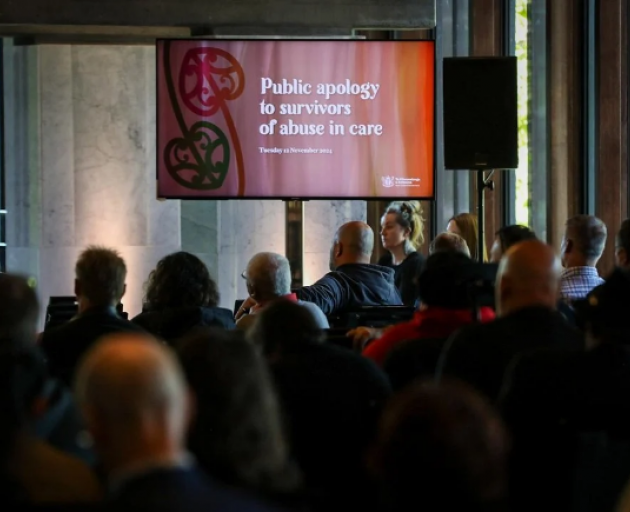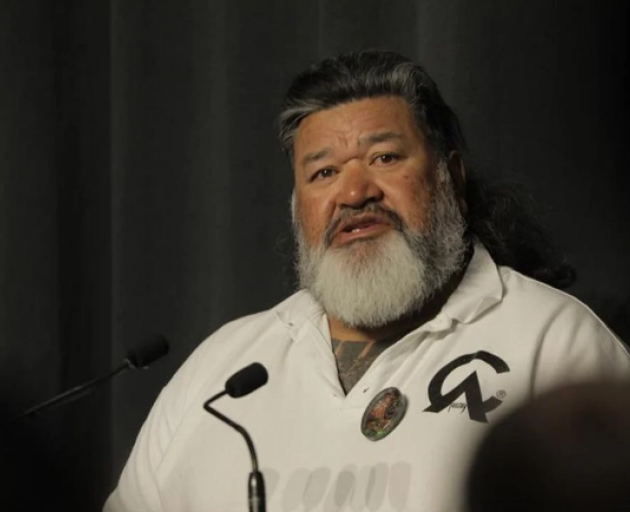Prime Minister Christopher Luxon has apologised on behalf of the government to thousands of people abused while in care, saying their treatment was "horrific, heartbreaking and should never have happened".
“The State you trusted let you down and for that I am sorry.”
It was a rare national apology to victims and families of hundreds of thousands of young people and vulnerable adults who were subjected to institutional physical and sexual abuse over the last 70 years.
The apology followed a report by a public inquiry in July that found some 200,000 children and vulnerable adults in state and faith-based care experienced some form of abuse from 1950 to 2019.
"It was horrific. It was heartbreaking. It was wrong. And it should never have happened," Luxon told survivors and their families in his speech at Parliament in Wellington.
"Today I am apologising on behalf of the government to everyone who suffered abuse, harm and neglect while in care. I make this apology to all survivors on behalf of my own and previous governments."
The Royal Commission of Inquiry into Abuse in Care was the largest, longest, most complex public inquiry ever held in New Zealand, spanning six years and collecting the evidence and experiences of more than 2400 survivors.
It detailed a litany of abuses in state and faith-based care, including rape, sterilisation and electric shocks, which peaked in the 1970s. Those from the Māori community were especially vulnerable to abuse, the report found, as well as those with mental or physical disabilities.
The inquiry delivered 138 recommendations, including calling for public apologies from New Zealand's government, as well as the Pope and the Archbishop of Canterbury, heads of the Catholic and Anglican churches respectively, who have previously condemned child abuse. It also called for new legislation including mandatory reporting of suspected abuse, including admissions made during religious confession, Reuters reported.
Luxon has said previously the government's response essentially boiled down to three things: acknowledgement and a formal apology, support for the survivors, and preventing the abuse from happening again.

"For many of you it changed the course of your life, and for that, the government must take responsibility," he said.
Luxon then outlined the Royal Commission inquiry and said though the stories it contained were harrowing and shocking to many, he told survivors:
"Not you. You knew the truth because you lived it, and you have waited and waited for people to start listening to you.
"Now New Zealand has listened. I have read your stories, and I believe you.
"You deserved so much better and I am deeply sorry that New Zealand did not do better by you."
The Prime Minister said he was apologising on behalf of his own and previous governments.
"I would like to acknowledge those who are not alive to hear this apology. Today we feel you here with us. And I extend this apology to you, your families and whānau.
"I would like to say again and to thank those who told your stories. You have been heard. And you are believed."

Opposition leader Chris Hipkins said he formally joined with the government in its apology, saying the day was a significant step forward.
"Today is a hugely important day for all of you, to finally hear what the Crown has failed to give you for all of these years, an apology. It is a hugely important day for us - the representatives of the Crown and of successive governments - that we finally, finally acknowledge the thousands of confronting experiences of neglect, abuse, trauma, torture, and that we finally own up fully to our failings and offer our sincerest apologies, the Labour Party leader said.
"We are sorry. Today all of Aotearoa New Zealand will bear witness to the truth, to what survivors experienced, to our decades of wilful ignorance, denial, minimisation and to our conviction to end such horror and vile acts from continuing."
Hipkins said the country owed a huge debt to survivors.
Bill to address safety in State care
The Prime Minister said the government had completed or started work on 28 recommendations from the inquiry and would provide its full response early next year.
A bill to include a range of measures to improve safety in State care would have its first reading in Parliament today.
Luxon said financial redress was very important to many survivors.
"Today I am announcing the government will invest an additional $32 million to increase capacity in the current system while we work on the new redress system."
"We will start work on removing memorials - including street names, public amenities, and public honours - of proven perpetrators. We will also work with local authorities to honour and care for unmarked graves located on sites that were places of care in New Zealand."
A new single redress system would be operating by next year, he said.
A National Remembrance Day would be held on November 12 in 2025.
The Royal Commission's report estimated the average lifetime cost to an abuse survivor was estimated in 2020 to be approximately $857,000 per person, though it did not make clear the amount of compensation recommended for survivors, Reuters reports.
Luxon said he believed the total compensation due to survivors could run into billions of dollars.

Govt departments express regret
The formal apology began about 9.45am with survivors at locations around the country tuning into livestreamed proceedings at Parliament, where a ballot-selected group of about 250 abuse survivors attended.
Lead Minister for the Response Erica Stanford led the apologies that also included heads of government departments who expressed regret, and survivors told of their experiences.
Speakers received a mixed reaction.
As Solicitor-General Una Jagose spoke, there were multiple shouts and boos from the audience. At times she had to stop because she couldn't be heard.
"You wanted us dead" one person called.
"You never treated us with dignity."
"You got paid big money to shut us up."
In Christchurch, after Una Jagose said lawyers should have treated survivors with dignity one person called out "you never treated us with dignity".
The disquiet and anger were palpable in the banquet hall at Parliament. Jagose stopped speaking as more boos and calls are made towards her.
Iwi then intervened with a karanga.
"I will not look away. We will do better," Jagose concluded her speech with as boos and a small number of claps rang around the hall.
Acting Police Commissioner Tania Kura was given a much calmer response.
"Our at-times singular focus on enforcement rather than exploring alternatives to criminal proceedings has been found to be misguided. There were also times where we did not consistently follow our own policies and general instructions which set out how we should manage and deal with children and young people," she said.
"These failures span decades and multiple police administrations, and as the current commissioner I take full responsibility for our organisation's past shortcomings. We have listened intently to your experiences. Your courage in coming forward has been profoundly moving."
Survivors speak
A video of Sir Robert Martin, who died earlier this year, was then introduced by Gary Williams, who was given a big cheer from those present.
Mr Williams said he's heard the apologies but the words would never be enough. Calls of agreement were made through his speech.
Sir Robert spent time in the Kimberley Centre, Campbell Park School and Lake Alice Hospital's Child and Adolescent Unit.
"My life in institutions meant I personally had nothing. Nothing to call my own... I was one of the lucky ones, I got out.
"I would like to see a citizenship ceremony for all who have been institutionalised in New Zealand."
There were tears as Sir Robert's video played.
In Christchurch, clapping broke out at the end of Sir Robert's video.
Fa'afete Taito started by acknowledging survivors who had "left to join their ancestors" and acknowledged the survivors who came forward and were ignored.

"If survivors had been nurtured and loved, cared for by the state, instead of discarded and ignored, we could have reached our full potential. But we weren't and here we are today.
"Many of us have learned to live with our undiagnosed trauma, to the point it became part of who we are." He said many survivors were conflicted over giving evidence, because they had hidden their trauma. "It hurts to dig around the pain. But beyond that, what we wanted and needed was some accountability for what happened to us."
He said today survivors would see what accountability looked like.
"My brothers and sisters of te whanau morehu, we can't do anything about the abuse that we suffered at the hands of the state. But we can be responsible for our healing. Regardless of what happens today, it is our collective power that'll contribute most to our healing journey. We owe that to ourselves," he said to applause.
"To the other side of this s***fight, you the State, you owe us too. It's not enough to say sorry. As any good parent knows, it's what you do to heal the wounds of your actions and make sure it never happens again that really counts. Make it count."
There were applause as Taito took the stage, silence throughout his speech as everyone listened intently. Claps and loud cheers rang out he called on the State to ensure there is no more harm.
Taito's speech was greeted by applause in Christchurch, and a call from the crowd supporting his comments and saying "the State owes all of us, you owe us our lives".

PM's absence criticised
Keith Wiffin spent time in Epuni Boys' Home, entering care at 11 years old.
He started by saying he has heard "those meaningless words" from the state before, and acknowledging those who did not survive their abuse, taking their own lives or having their lives shortened as a result of the neglect and abuse.
There was strong applause in the room and in Christchurch when he mentioned timelines around redress. Strong applause again when he said to Prime Minister Chris Luxon “it is time to deliver”.
He said the scale of abuse revealed by the Royal Commission tore communities and lives apart.
"It has tarnished our international reputation as an upholder of human rights. Something this nation likes to dine out on."
He said the Prime Minister's speech at the tabling of the Royal Commission's final report made survivors believe redress was close.
"You gave hope and you raised expectation that redress would soon be delivered. It is time to deliver."
"Ultimately, it is the system itself that is the problem. It has failed us."
"Prime Minister you must hold churches and faith-based organisations to account. You must compel them to do what's right as the state has an obligation to all children under its roof."
Survivors applauded and whistled as Wiffin made the call for accountability.
"Hopefully today is a catalyst for significant change. Otherwise it's been a waste and hollow words."
Tu Chapman was next to take the stage, getting emotional when speaking.
There was strong applause after their call for the abolishment of the Children's Ministry.
"You owe us right now," Chapman said to the Prime Minister.
Chapman was the last of the survivors to speak to the event. He was placed in State care at just 18 months old and remained under this until 17.
"Five minutes. That's what each of us have been given to speak on behalf of tens of thousands of survivors in response to today's apologies. Five minutes for decades of abuse, neglect, and torture by those running state, church, and faith-based institutions. Five minutes is all this regime has afford us to respond to a Prime Minister's apology we haven't even yet heard.
“Prime Minister, put your money where your mouth is.”
Chapman criticised Luxon for not being at the apology event earlier today.
"This is not survivors' response. It's our challenge Prime Minister as we count down the minutes to your speech. Survivor voices is how we've been framed in the official programme but right now I feel alone and in utter despair at the way in which this government has undertaken the task of acknowledging all survivors."
Following his speech in the House, Prime Minister Christopher Luxon told media he couldn't be at the gathering as he had to prepare for his own speech, RNZ reported.
However, he said he intended spending some time with survivors today. He had also read the Royal Commission's report which made for "harrowing" reading.
- Reporting by ODT Online, RNZ and Reuters













